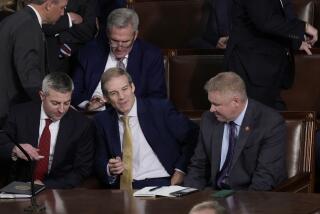Progressive Leadership for Jordan
- Share via
Jordan is a poor country in the center of the tumultuous Middle East, yet there stands its king, Abdullah II, trying to fulfill his aspiration of Jordan as a “center of excellence and achievement.” Despite the obstacles, he is moving in the right direction. A free-trade agreement with the United States that he signed in Washington Tuesday should help deliver the foreign capital that the kingdom needs. With the region in turmoil, Abdullah is sensibly trying to tie Jordan’s fortunes to closer relations with Washington. Egypt should try that as well.
For the United States, the trade agreement has a broader and more important meaning. It is designed to reward allies in the shattered peace process and stimulate economic growth and cooperation in the hope that the more prosperity these countries share, the less likely they are to fight each other.
Middle Eastern economies remain isolated from the rest of the world and from one another. Only 6% of trade stays in the region, compared with about 40% for the developing countries of Asia. Outside of oil, the Middle East has little of economic value to offer to the world. Violence drives foreign investors away, and even much domestic capital finds a better home in Western markets.
The free-trade deal with Washington puts Jordan on an equal footing with Israel, Mexico and Canada. The deal justly rewards Jordan for its support in U.S.-brokered peacemaking with Israel and enhances Abdullah’s standing in the Arab world. But the economic effects will not be immediate and will greatly depend on Amman’s completion of economic deregulation and reforms.
What has already produced encouraging results is a U.S.-inspired industrial-zones program designed to make Jordan and Israel work together. Under that 1998 program, goods made in the Jordanian zones--in which Jordan, Israel and outsiders invest in equal shares--are given duty-free access to U.S. markets. Already, some 7,000 jobs have been created in dozens of plants producing items such as watches, clothing, jewelry and telecommunications equipment.
Washington has offered similar trade terms to President Hosni Mubarak of Egypt in recognition of his helpful role in the Middle East. Mubarak, however, is less eager than Jordan’s Abdullah to make the necessary concessions or to cooperate with Israel. That’s unfortunate because a free-trade agreement with the United States could be the best peace dividend the disillusioned Egyptians are likely to see.
More to Read
Sign up for Essential California
The most important California stories and recommendations in your inbox every morning.
You may occasionally receive promotional content from the Los Angeles Times.










